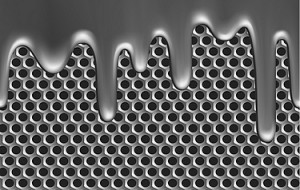 Next generation materials called metallic glass are ultra-strong and ultra-flexible and will become easier and cheaper, according to an UNSW Australia research that can predict for the first time which combinations of metals will best form these useful materials. These materials behave more like glass or plastic than metal.
Next generation materials called metallic glass are ultra-strong and ultra-flexible and will become easier and cheaper, according to an UNSW Australia research that can predict for the first time which combinations of metals will best form these useful materials. These materials behave more like glass or plastic than metal.
While still being metals, they become as malleable as chewing gum when heated and can be easily moulded or blown like glass. They are also three times stronger and harder than ordinary metals, on average, and are among the toughest materials known. “They have been described as the most significant development in materials science since the discovery of plastics more than 50 years ago,” says study author, Dr Kevin Laws, from UNSW Australia in Sydney.
Most metals are crystalline when solid, with their atoms arranged in a highly organised and regular manner. Metallic glass alloys, however, have a highly disordered structure, with the atoms arranged in a non-regular way.
“There are many types of metallic glass, with the most popular ones based on zirconium, palladium, magnesium, titanium or copper. But until now, discovering alloy compositions that form these materials has required a lengthy process of trial and error in the laboratory,” says Dr Laws.
In the new study, published in the journal Nature Communications, Dr Laws and his colleagues describe a unique new model of the atomic structure of metallic glass, which allows scientists to predict the metal combinations that will have glass-forming ability.
They have used their model to successfully predict more than 200 new metallic glass alloys based on magnesium, silver, copper, zinc and titanium in the past few years.
“With our new instruction manual we can start to create many new useful metallic glass-types and begin to understand the atomic fundamentals behind their exceptional properties. We will also be able to engineer these materials on an atomic scale so they have the specific properties we want,” says Dr Laws.



